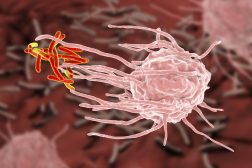Definition
noun
A viscous, slippery secretion of a gland that protects and lubricates surfaces
Supplement
Mucus refers to the viscous, slippery substance that is secreted by the glands. It is the free slime of the mucous membranes. It consists of the secretion of the glands, along with various inorganic salts, desquamated cells and leucocytes.
The main function of mucus is to protect and lubricate surfaces. For instance, in the gut, it lubricates the passage of food. It also protects the epithelial cells, such as those lining the skin, respiratory, gastrointestinal, urogenital, and other bodily systems. In the nose, the throat, and the lungs, it prevents bacteria and other pathogenic agents from easily penetrating the body through the epithelium. In humans, the gastrointestinal tract is the major source of mucus. Some animals secrete mucus externally. Examples include bony fish, snails, slugs, and hagfish. Their mucus does another important function, i.e. for facilitating movement and communication.
One of the major components of mucus is mucins. Mucins are glycosylated proteins capable of forming gels. They are responsible for the polyelectrolyte effect in mucus. This effect regulates the influx and efflux of water in the mucus.
See also:
Related term(s):




